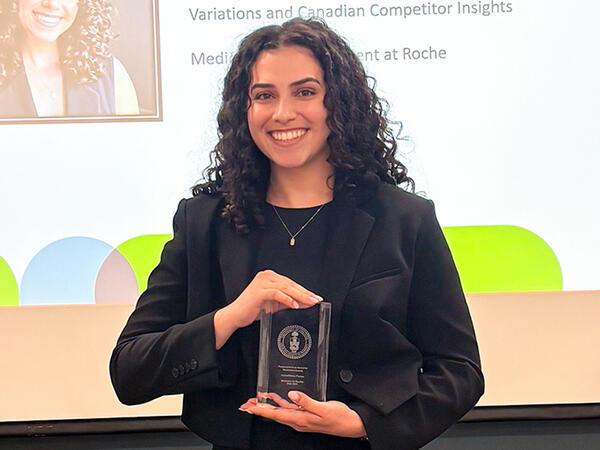Two residents at Roche publish research that illuminates aspects of pharma industry in Canada
Two students in the Leslie Dan Faculty of Pharmacy have published papers based on their residency research projects — one on field-based medical affairs roles in the pharmaceutical industry and the other on the impact of drug-transfer devices on oncology biologics.
The research sheds light on overlooked areas of the pharmaceutical industry, and together with the residencies provided the students with opportunities to develop key skills and gain knowledge that will benefit their careers in industry.
Munaza Saleem and Manny Khaira are PharmD graduates from the University of Waterloo, who started residencies at Roche through Leslie Dan Faculty of Pharmacy’s Industrial Pharmacy Residency Program in September 2019. Saleem worked in the medical affairs department and Khaira worked in regulatory affairs, each under the supervision of tenured experts.
Both became interested in indirect patient care roles in pharmacy after their PharmD rotations and wanted to help patients by contributing to the development of new therapeutics.
The year-long industrial residency program administered by the Leslie Dan Faculty of Pharmacy provides PharmD graduates with the opportunity to work in one or two departments at participating pharmaceutical companies.
“The IPRP is an excellent, comprehensive program to learn more about the complex commercialization process of new medications.”
“The IPRP is an excellent, comprehensive program to learn more about the complex commercialization process of new medications,” says Monica Gautam, assistant professor (teaching stream) and coordinator of the IPRP. “Additionally, our residents are challenged to begin to develop the knowledge and skills to be successful in this competitive and rewarding field.”
“To have at least two residents from their cohort publish their major project is an absolutely wonderful achievement,” Gautam adds.
A major research project is a key aspect of the program. Saleem’s research examined field-based medical affairs roles, most commonly known as the Medical Science Liaison (MSL), and their impact at pharmaceutical companies.
She led a collaborative group of senior leaders across six pharmaceutical companies that surveyed MSL managers at pharmaceutical companies across Canada to understand the performance metrics they use to measure success of their teams.
The group aimed to identify the metrics that managers use most often, as well as those that MSL managers find most valuable. Importantly, they found a disconnect — while pharmaceutical and biotechnology companies frequently collect quantitative metrics such as the number of interactions with health care providers, MSL managers placed more value on qualitative metrics, including feedback from health care providers or internal teams.
Saleem says that the study is the first to examine these metrics in Canada, to her knowledge. “The literature in this field is very limited, and these results could provide better guidance and direction for MSLs and medical affairs teams in pharmaceutical organizations in Canada and globally,” she says. “But they may also help drive strategy and direction for the evolving field-based medical role that is really integral to the pharmaceutical and biotechnology industry.”
Saleem says the IPRP residency at Roche was an overwhelmingly positive experience, and the mentorship and networking opportunities opened her eyes to a wide range of opportunities in industry. When her residency ended in August 2020, she started a full-time role as an evidence generation associate at Roche.
“The residency truly fostered a learning environment,” she says. “It is amazing to work every day with teams that are dedicated to helping patients and are passionate about health innovation.”
Research project allows resident to “contribute to the company and scientific community”
In Khaira’s day-to-day responsibilities in the regulatory affairs department, he helps oncology product teams prepare to bring new drugs to market. Khaira used the industrial residency research project to explore the medical device industry as it pertains to oncology biologics, specifically closed-system transfer devices.
He surveyed health care workers about their use of these devices, which are designed to prevent contamination in the preparation of medications and also protect health care workers from exposure to potentially hazardous drugs.
Khaira found that health care workers often use the devices when preparing highly sensitive oncology biologics, even when these drugs have not been deemed hazardous, and that this practice has the potential to harm patients by exposing them to contamination or reducing the quality of the medications.
The results may help to inform guidance from health authorities and other stakeholders about how these devices should be used — in fact, Khaira presented the preliminary results at a meeting with Health Canada in 2020.
“The program really helped solidify my career path, narrow down my focus and gain a very robust skill set that I can use across industry and regulatory affairs that will be transferable wherever I go.”
After his residency, Khaira accepted a role at Roche as a regulatory program manager in oncology.
“The residency is very fast-paced, you’re challenged a lot, and the expectations are very high,” he says. “The program really helped solidify my career path, narrow down my focus and gain a very robust skill set that I can use across industry and regulatory affairs that will be transferable wherever I go.”
Khaira says that the research projects, and the mentorship and support IPRP residents get from managers to pursue these projects, are key learning experiences as well as opportunities for residents to demonstrate their value to the company.
“It’s a way to learn more outside of your day-to-day work and communicate your research more broadly,” he says. “You have a good opportunity and you’re supported to conduct this research, so leverage the chance to explore something new and contribute to the company and scientific community.”
More News
Image

Research team aims to co-design diabetes and dementia support programs that meet community needs
Network for Health Populations funding will support collaborative project to improve health outcomes for immigrant communities in Mississauga.
Read More
Image

Pharmaceutical industry resident finds growth in new challenges
Pharmaceutical Industry Residency Program Award recipient AnnaMaria Passas gained new skills through residency and research project to improve marketability in industry.
Read More
Image

Pharmacy alum sees change in acceptance of Indigenous cultures in health care
During Deborah Emery’s 40-year pharmacy career, she provided care in Sioux Lookout, Thunder Bay and Manitoulin Island.
Read More
